Last March, the website Business Insider named 10 people who most influenced the direction of the Internet. At the top of its list were Facebook’s Mark Zuckerberg, Google’s Larry Page, Apple’s Steve Jobs, and a software designer who deserves to be just as familiar: Matthew Mullenweg. Mullenweg created WordPress, the Web’s most popular content management system, which power’s about 15 percent of the world’s top million websites. The platform’s users include news organizations (Le Monde, New York Times), businesses (Samsung Newsroom, Adobe), celebrities (Katy Perry, Kobe Bryant), and technologists (TechCrunch, Mashable, Mozilla Labs, Spotify, GigaOm, Wired). Such is WordPress’s far-reaching popularity that nearly every week a locally-organized WordCamp conference―discussing all aspects of the platform--is held somewhere in the world. Mullenweg organized the first WordCamp in San Francisco in 2006 and has delivered his annual "State of the Word" keynote there ever since.
Mullenweg began his career in 2002, at age 19, while a student at the University of Houston. He was looking for a better blogging platform and had switched from Movable Type, which he found too slow, to the open source b2/
- Let’
s begin with Automattic. What was the inspiration, and what do you do? Part of the idea behind Automattic was to see if we could create a company whose commercial interests were completely in line with the community interests around WordPress. Automattic is the company behind WordPress.
com, which is powered by WordPress open source software. But because all the software is identical to what you can download and install yourself, we donate all our code back to the open source project. That makes for a very nice virtuous cycle, and it’s one of the reasons that WordPress is able to release updates and significant upgrades at a much faster pace than most open source projects. - The open source community has had an uneasy relationship with private companies.
I think the two are naturally complementary. People often mistakenly equate open source with “no profit.” But the first freedom of the GPL [GNU General Public License] is the freedom to use the software for any purpose―including the ability to sell the software, resell it, and rebrand it. With Automattic, we have tried to create a company that sells things that are valuable to people: for example, providing a domain name when they sign up for a WordPress.
com blog. But we are not, for the sake of profit, holding back functionality or artificially hampering the user experience. - As your experience straddles both, where do you think open source excels? And where is it weak?
The open source model is probably best in the world at bringing together hundreds of people, from casual passersby to those who are deeply involved, to make constant, incremental improvement to core software. For projects with a clear goal―like the Linux kernel or Wikipedia―having an efficient method for people to contribute outstrips anything any proprietary company could do. The weaknesses are that it’s harder to make radical changes and do design. And those two are very much related. Open source is best at incremental improvements of things you already do, as well as responding to user requests. But with open source, it’s a lot harder to move the community to do something that users have never imagined they want. The problem is not impossible to overcome. But it means that whoever is leading the change must lay out the case as a compelling direction for the future―and to do it before a single line of code is written.
- You’
ve taken an experimental approach to entrepreneurship: Automattic is involved in a lot of projects. For products, there is no guarantee that the thing you create, even if you create it perfectly, is going to have any sort of consumer appeal. So the key is to create as much as possible, to be prolific in your output. Some of our projects may have begun as one person working for six months. Then after it launches and gets significant traction, we double down our investment in it.
- You’
ve written that people thought of Steve Jobs as a no-compromise perfectionist, but you like Apple for the opposite reason: that they aren’ t afraid to release a rudimentary version 1. 0. “A beautiful thing about Apple is how quickly they obsolete their own products.” It’s the hardest thing to do in product development. You invest your life into something and when it finally gets out there, it’s such a vulnerable moment. The reality is that most things you launch are going to fail, or are not going to be the hits that they could be. But without launching them, it’s impossible to get the feedback you need to make them into what they will ultimately become. Like the iPhoneb4. The earlier iPhones weren’t that great. They were relatively slow and clunky. They were beautiful in their own way, but the fourth generation was a turning point: it’s incredible what they have done, but it only happened over four iterations.
- At one point, WordPress’
s release cycle had a long pause because people were looking for one more strive toward perfection. It’s a constant struggle, and we are struggling with that right now. We’re ready to freeze the code for WordPress 3.
3. But one of the developers had been out of the loop for a few weeks, so he wasn’t able to get the features that he wanted to into the release. Now the natural inclination for everyone, including myself, is to push the timeline back a little bit so he can squeeze those features in. But if that happens too many times, you end up with a year or two between the releases. Everyone has to make a mistake at least once. We made it several times before we figured it out. - WordPress has transitioned from a blogging platform to something broader. How has that happened?
For about five years now, the goal of WordPress has been to democratize publishing. We want to make it easy and successful for anyone anywhere in the world, in any language, to have a beautiful website. And we’ve slowly seen that happen. When I ask for a show of hands at the WordCamp San Francisco conference, 90 to 95 percent of the room is using it to power their entire website, often using WordPress plugins like ecommerce software and forums.
The key is to have a tool you can adapt to your own use. At my State of the Word address last August, I talked about an analogous idea I borrowed from Kenya Hara, the art director of the Japanese retailer MUJI, which makes beautiful “brand-less” products. He gives this talk about Western versus Japanese knife design, which I think reflects our approach versus other social media platforms. He shows a German knife--it’s beautiful and ergonomic. When you look at it, you know exactly where you should put your thumb. He contrasts this with a Japanese knife, which is “empty” in the sense that like a bowl, it can be filled a million different ways. You can hold it in many different ways, and the knife in its simplicity can adapt to many different uses. We try to do the same with WordPress: it can be used for anything.
- I did a story about very local online newspapers, who are often struggling, adapting WordPress to their needs.
That’s true, and the cool thing is that these small publications can use the exact same software as The New York Times does. CNN began using WordPress after they found that their regular platform was too slow for breaking news
- Is this widespread adoption due to the power of a blogging platform, or is it more a triumph of the open source model?
Blogging as a medium has significantly changed how people think and publish. It has changed both authors’ expectations for how quickly they should be able to publish, as well as the public’s expectation for how fast they will read it. I think WordPress has been successful over the past 8.
5 years because we have responded to user requests and stayed current with how this world has changed. - If WordPress was not open source, how would that affect its adoption rate?
Certainly, some proprietary software has reached the adoption level of WordPress. But even if you imagined a parallel universe where WordPress was proprietary and had the same usage, it wouldn’t have the same developer community. Facebook and Twitter have developers, but they are second class citizens on the platform. They are like digital sharecroppers on someone else’s domain, at the whim of the commercial platform they are supporting. But with WordPress, when you build something on it, you own the platform as much as I do. So you invest in it in a different way because you know there are fundamental property rights over what you are creating, that it belongs to you, and no one can take it away from you. That engenders a different kind of participation.
- Unlike some technologists who have become entrepreneurs, you haven’
t quit programming. It’ s still an important part of your life. I find coding is an incredible means of self-expression. Scripting is the new literacy. A hundred years ago, the dividing line was the ability to read and write. Today, it’s between people who can code simple things, and those who can’t. It’s so liberating to have an idea and be able to bend the computer to your will. I’ve found that of the most rewarding experiences in life is to create something that provides a useful function for other people. There’s an intrinsic goodness in it, like how I imagine what a true craftsman would put into a chair, table or door. You build it for the ages. You can do that with code as well, particularly with open source software, where people do the work because they love it.
Open source programming is also a wonderfully democratic opportunity. Anyone can drop in and make suggestions, and it doesn’t matter where you are in the world or are, or what school you went to or what your job is. You are judged purely on your contributions. That’s what I found so rewarding at a young age. As a teenager, no one takes you seriously--that used to drive me crazy. But online, no one knows you’re a 19 year old kid in Houston.
- You’
re an amateur jazz saxophonist. Does jazz have anything to teach about software development? I’ve thought about this a lot. One big thing is that both require a lot of steady practice: you have to do it every single day. And one thing I noticed early on is that the people who become amazing musicians sound terrible when they practice. If you went by the practice room, you would want to cover your ears. And the reason is that they were practicing what they were bad at. It’s so tempting when people are listening to run through the things you can blaze through. But that’s when you need to practice the stuff that you are worst at. That’s the only way you are going to make yourself better.




